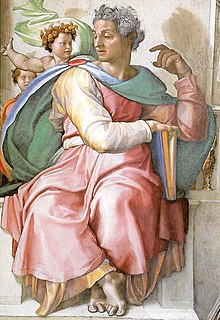Isaiah | |
|---|---|
 Fresco from the Sistine Chapel ceiling by Michelangelo | |
| Prophet | |
| Born | 8th century BC |
| Died | 7th century BC |
| Venerated in | Judaism Christianity Islam[1] |
| Feast | May 9[2] Thursday after the Feast of the Transfiguration (Armenian Apostolic Church)[3] |
| Major works | Book of Isaiah |
Isaiah (UK: /aɪˈzaɪ.ə/ or US: /aɪˈzeɪ.ə/;[4][5] Hebrew: יְשַׁעְיָהוּ, Yəšaʿyāhū, "Yahweh is salvation";[6] also known as Isaias[7] or Esaias[8] from Greek: Ἠσαΐας) was the 8th-century BC Israelite prophet after whom the Book of Isaiah is named.[9][10]
The text of the Book of Isaiah refers to Isaiah as "the prophet",[11] but the exact relationship between the Book of Isaiah and the actual prophet Isaiah is complicated. The traditional view is that all 66 chapters of the book of Isaiah were written by one man, Isaiah, possibly in two periods between 740 BC and c. 686 BC, separated by approximately 15 years.
Another widely held view suggests that parts of the first half of the book (chapters 1–39) originated with the historical prophet, interspersed with prose commentaries written in the time of King Josiah 100 years later, and that the remainder of the book dates from immediately before and immediately after the end of the 6th-century BC exile in Babylon (almost two centuries after the time of the historical prophet), and that perhaps these later chapters represent the work of an ongoing school of prophets who prophesied in accordance with his prophecies.[a]
- ^ Historical Dictionary of Prophets in Islam and Judaism, B. M. Wheeler, Appendix II
- ^ St. John the Baptist Byzantine Catholic Cathedral, Holy Prophet Isaiah Archived 2017-06-27 at the Wayback Machine
- ^ "Holidays | Qahana.am". Archived from the original on 2022-02-01. Retrieved 2021-07-14.
- ^ Wells, John C. (1990). "Isaiah". Longman pronunciation dictionary. Harlow, England: Longman. p. 378. ISBN 978-0-582-05383-0.
- ^ Rippin, A., "S̲h̲aʿyā", in: Encyclopaedia of Islam, Second Edition, edited by: P. Bearman, Th. Bianquis, C. E. Bosworth, E. van Donzel, W. P. Heinrichs.
- ^ New Bible Dictionary, Second Edition, Tyndale Press, Wheaton, IL, 1987.
- ^ "CATHOLIC ENCYCLOPEDIA: Isaias". www.newadvent.org. Retrieved 2022-12-27.
- ^ "Bible Gateway passage: Luke 4:17-21 - King James Version". Bible Gateway. Retrieved 2023-04-29.
- ^ The Scofield Study Bible III, NKJV, Oxford University Press
- ^ De Jong, Matthijs J., Isaiah Among The Ancient Near Eastern Prophets: A Comparative Study of the Earliest Stages of the Isaiah Tradition and the Neo-Assyrian Prophecies, BRILL, 2007, pp. 13–17
- ^ Hebrew-English Bible, Isaiah 38:1
Cite error: There are <ref group=lower-alpha> tags or {{efn}} templates on this page, but the references will not show without a {{reflist|group=lower-alpha}} template or {{notelist}} template (see the help page).